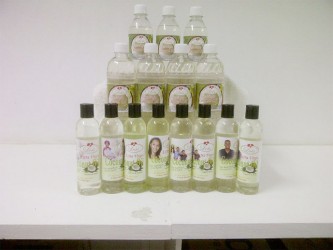The South American Coco Company may still be some distance away from the big leagues in what is now a rapidly expanding and, these days, is a global multi-million dollar industry—the manufacture and marketing of coconut byproducts—but Lois Rickford, proprietor of the two-year-old West Coast Berbice-based enterprise believes her business is headed in the right direction. Since the commencement of production, Lois’ Extra Virgin Coconut Oil has caught the attention of consumers and distributors both here in Guyana and in neighbouring Suriname. She is currently in the process of filling a sample order from an outlet in Jamaica. The order is valued at around half a million Guyana dollars, a miniscule sum in the broader context of the global industry.
Rickford believes, however, that it is “a critical breakthrough” for her company, its significance reposing in the fact that close as it is to the United States, Jamaica is one of the more demanding markets in the Caribbean Community and entry into that market could open a coveted gateway to far more lucrative markets in North America.
It is the determination of the former commercial bank employee to ensure that her company’s products rise above the barriers that have long placed restraints on access to bigger markets in North America and Europe that drives her. She believes that a point has now been reached where the local manufacturing sector must look beyond limited local and regional markets though she says she is not unaware of the hard work and the cost associated with meeting the high standards of extra-regional markets.

What enthuses Rickford most about her potential new market is the fact that exposure on the Jamaica market could bring her Extra Virgin Coconut Oil interest to the attention of the island’s wider visitor market. “That could just be the sort of opening that we are looking for,” she says.
Interestingly, her Jamaica order did not derive from any particular marketing initiative in that country. It is, she says, the same with the gradual popularization of the product elsewhere in the region. “People come to Guyana, see the product, like it, use it and take it home with them,” she says.
Rickford believes this is a tribute to both the quality of the product and the eye-catching appearance of her packaging.
As current global demand goes, the South American Coco Company is batting on a helpful wicket. Virgin Coconut Oil is derived from fresh coconut meat rather than from copra through processes like fermentation, centrifugal separation and enzyme action. The production process involves the application of little or no heat and produced this way the oil retains valuable antioxidants and fatty acids. One of the more trusted varieties of coconut oil on the global market Virgin Coconut oil is associated with health benefits that include hair care, skin care, stress relief, cholesterol level maintenance, weight loss, digestion and regulated metabolism. These benefits are attributed to the presence in the oil of lauric acid, caprice acid and caprylic acid and their anti-microbial, anti-oxidant, anti-fungal and anti-bacterial properties.
On the local market demand for the company’s Extra-Virgin Coconut oil remains modest. Raw coconut oil, manufactured from copra has still not graduated from its traditional status as a parochial product in massages and an all-purpose remedy for some types of ailments, particularly in children. On the other hand Guyana’s connection to the international beauty and health industries has meant that Coconut Oil has become a product of choice in spas and beauty parlours. Since its appearance on the market Lois’ Extra Virgin Coconut oil has also been seen on the shelves of some of the more popular pharmacies and supermarkets.
While she understands that the incremental growth in demand for the range of products which the company plans to turn out at the rate of one per year will rely heavily on investment in marketing, “down the road,” she is, for the time being at least, relying on the quality of her own product coupled with evidence of a fair measure of professional attention to bottling and labelling.
She has observed and taken note of the considerable attention which the global manufacturing sector pays to packaging and labelling. But for her product presentation remains a work in progress. The cosmetic coconut oil which is produced in three scents—Musk, Baby Powder and Women’s Diamond—is presented in a slender clear plastic bottle fitted with a jet black spout and a colourful label. The dietary coconut oil is presented in a routine plastic water bottle.
Two flavours of soaps complete the product range—at least for the time being—and these are already on the local market.
Despite what she is treating as a potentially significant breakthrough in Jamaica, Rickford is loathe to sound glib on the subject. She has embarked on what would seem to be an ongoing search for appropriate bottles and is not averse to tinkering with her labelling to render it more attractive. “Experience has taught me not to get too far ahead of myself. We’re in a competitive industry and there is need to spend as much if not more time refining products [and] their presentation…. Once we’re out there on the market we have to be ready,” she says.




